Account Login
Don't have an account? Create One
Back in September, we put out a call for nominations for innovators who had found a way to turn their creativity and passion into a revenue stream. There were only two other qualifying criteria: they have to live in Atlantic Canada and they have to be 30 or younger as of our November 7 publication date.
And boy, did we get a response.
Our chosen 30 Under 30 are building the future of our region, helping solve world-sized problems like climate change from right here at home. And they’re dedicated to this region. Every one of them said without hesitation that they were in this to build the Atlantic Canadian economy and improve the local quality of life.
Doom and gloom? Not with all this heart and innovation on the horizon.
To learn about the Nova Scotia innovators who made our 2019 30 under 30 list, read on…
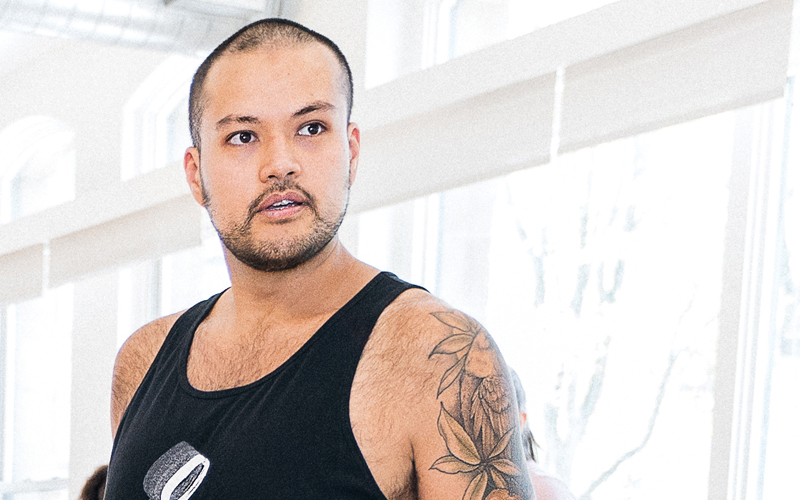
Abady Alzahrani (28)
Owner
House of Eights Dance Studio (Halifax)
There are plenty of dance studios aimed at kids and young people in Halifax, but the opportunities dry up once dancers turn 18 and age out of the studios. Abady Alzahrani wanted to give adults a place to dance so he quit his full-time job in marketing. In January 2019, he opened House of Eights Dance Studio in a space shared with other creative groups and endeavours.
It was a huge personal risk, but the business was instantly popular. Now he’s operating in his own space, offering drop-in jazz, hip-hop, funk, heels and even cannabis-friendly improv classes to adults. The bulk of his customers are in their 20s, but there are also people in their 30s, 40s and 50s taking part.
He says the experience of opening his own business was both terrifying and illuminating: terrifying for obvious reasons; illuminating because it showed him a whole new side of his city. “The business community has been so amazing. The amount of people that you meet at networking events, they’ll go out for coffee with you and give you advice,” he says. “I’ve always loved Halifax, but that made it even better.”
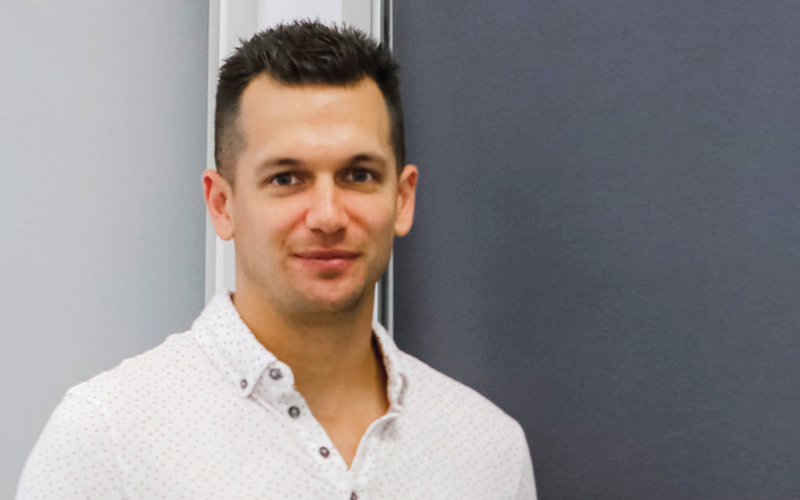
DAVID HOWE (29)
CEO
Cribcut (Halifax)
David Howe founded his first company, Mass Landscaping, in 2008 at age 18. Then he founded an online toothbrush subscription service, sold to GoodMouth in 2014. He also co-founded RetailKit which he sold to a California company in 2015. It should be no surprise then that he doesn’t often have the time to head to a barbershop. He created Cribcut in 2017 so the cuts could come to him.
“I thought there was a better way to get my trim, so I decided to put a business out in the world and see if others were as crazy as me,” he says.
Cribcut is like Uber for haircuts. Using an app, people can request a stylist to come to their home or office and take care of their hair. Right now, Howe says the bulk of his business comes from other businesses (over 200 of them), many of which are in San Francisco, New York and Los Angeles. Last year, the company grew by 40 per cent in just six months, and it now employs nine people full-time. Last spring, Cribcut landed $1 million in pre-seed funding from investors like Innovacorp and Ramen Ventures. “The benefit of Atlantic Canada is that it’s a very tight-knit community. Everybody’s here to support each other,” he says.
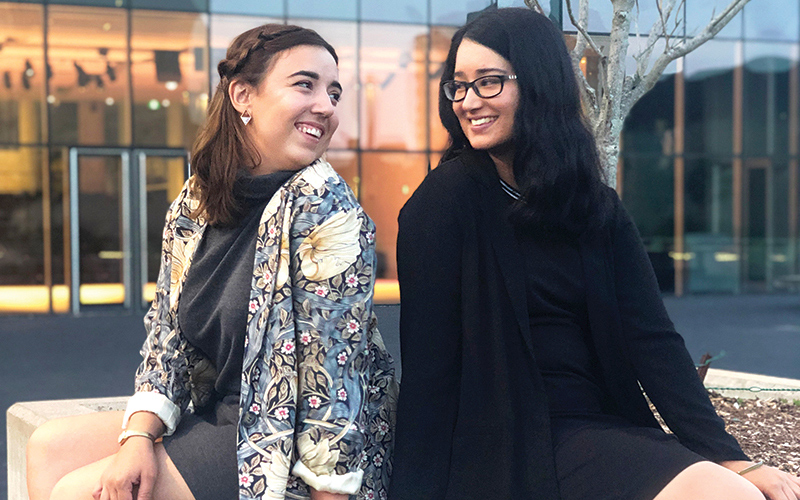
LEFT: FREYA POIRIER (24)
RIGHT: GURNEET DHAMI (25)
Volunteer mentors and business coaches (Halifax)
Gurneet Dhami and Freya Poirier are commercializing innovation in a much different way than the rest of the people on this list. They’re forging connections with young entrepreneurs—especially young women entrepreneurs or people from backgrounds that may not be commonly found in entrepreneurial circles—and helping them commercialize their creative ideas. The duo, who are members of Mount Saint Vincent University’s Centre for Women in Business, attend networking events where they keep an eye out for someone who may need some help building connections or even the confidence to pitch an idea. “Just having those frank discussions about leadership and the struggles that we face,” Dhami says. “At the end of the day we all have the same struggles.
To offer hands-on training and advice to younger future business owners, Poirier even launched a chapter of Enactus, a network of groups supporting entrepreneurs at schools and universities across the world. The chapter made its debut at the 2019 Atlantic Canada Regionals.
All this volunteer work comes from their own experiences as young women in the startup world. “It is usually a male-dominated field,” Poirier says. “I come from an art and design background, so going into the startup world, it was always very intimidating not knowing where I fit in.”
She’s an undergraduate design student at NSCAD University, which is where she launched—and is now co-president of—the Enactus group. Dhami is a graduate student in Applied Human Nutrition at Mount Saint Vincent as well as a community liaison with the NSCAD Enactus group. They met in February 2018 at Food Hack Nova Scotia where their pitch for a sustainably-sourced fertilizer made from waste from the lobster fishery took the top prize. They took the product (Second Wave) to other pitch contests including Launch Dal’s Techstars Startup Weekend at Dalhousie in November, 2018. They did well but decided they weren’t ready to start a business around it. “Sometimes it’s hard to know when to let go,” Poirier says “I’m really happy that we got there.”
The experience informs the unique perspective they bring to their mentoring and support of younger entrepreneurs, she said. Right now, she’s helping the NSCAD Enactus group sharpen their idea for a suite of online courses to help students learn Adobe’s design programs like Illustrator and InDesign. “We’re still a small team and we’re still building ourselves,” she says.
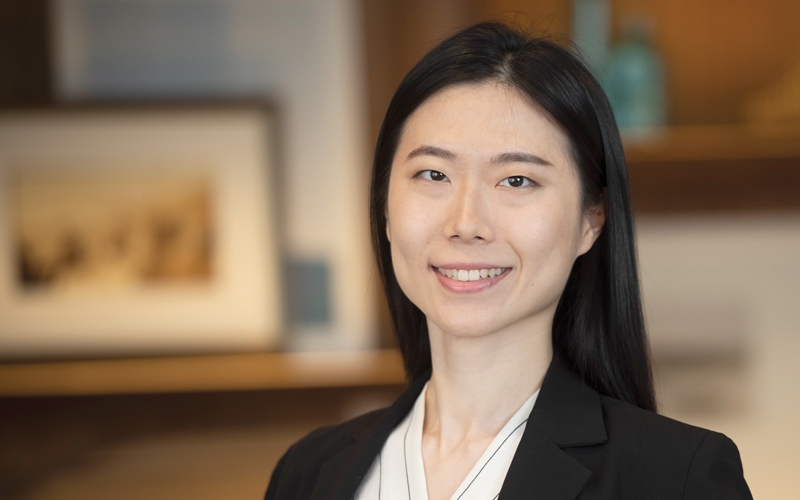
TIANSHU HUANG (27)
Data Scientist
Property Valuation Services Corporation (Dartmouth)
Putting in the time and money to train the right people can really pay off. Just ask Tianshu Huang. She went to work at Nova Scotia’s Property Valuation Services Corporation (PVSC) with a background in statistics and a love for data. The organization, which assesses property values to inform municipal decisions about taxes, recognized her potential and trained her and a few co-workers in artificial intelligence (AI). Now she’s part of a team that has designed an AI-based valuation system that could change the entire field.
The modelling tool Huang helped create can quickly analyze massive amounts of data to predict future market values, a process that is typically time-consuming and labour-intensive. It also eliminates human subjectivity from the process. Rebecca Vorstermans, a spokesperson for PVSC, says it was the first system to use machine learning in North America—an impressive feat for an industry she says is historically slow to change.
As a non-profit mandated by the Nova Scotia government, PVSC representatives attend trade shows and conferences to show how AI can change the property valuation field. By sharing their knowledge, they hope their new methods will be adopted across the industry.
“I’m part of this whole revolution,” Huang says.
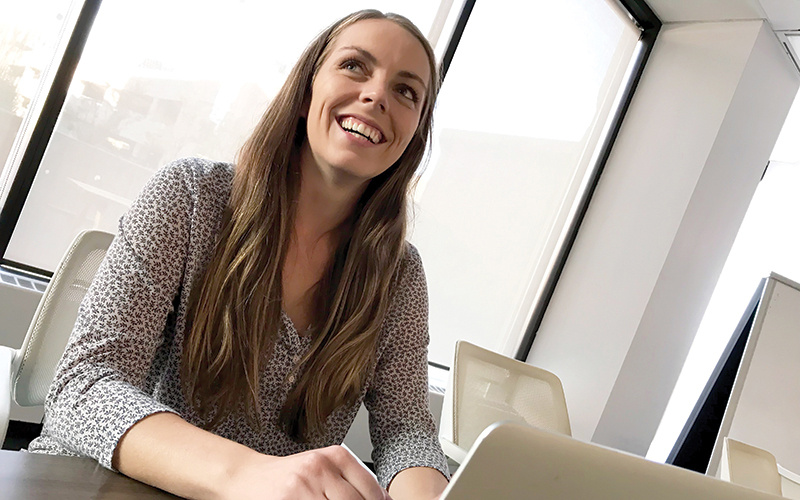
EMMALINE ATHERTON (27)
Co-Founder
Arolytics Inc. (Halifax)
Canadian oil and gas operators are facing new legislation to measure and report methane emissions; when the rules kick in January 2020, Emmaline Atherton’s company Arolytics Inc. will be there to help. Arolytics’ software can assist companies to manage their emissions data, identifying where and when irregular emissions or leaks might be happening. Companies can also look at statistics about their emissions over time, making it easier for them to file their emissions reports.
When companies understand why certain components are prone to leaks, those parts can be repaired, thereby improving overall operations and lowering emissions. “We’re hoping through that approach, we’d make emission monitoring a no-brainer for industry. They won’t just be doing it to comply with the regulations, they’d be doing it because it improves their operations.”
The software came out of Atherton’s work with her two co-founders (Liz O’Connell and Dave Risk) at St. Francis Xavier University, where they studied methane emissions from the oil and gas industry. With the new legislation on the horizon, they recognized they had an opportunity to turn their work into a business.
Arolytics won $25,000 at this spring’s Volta Cohort pitch competition. Atherton hopes to begin industry trials later this fall.
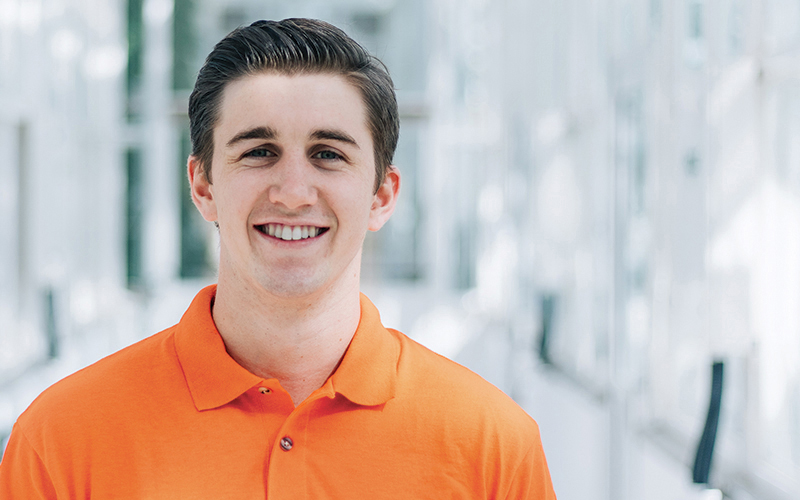
LOGAN MacGILLIVRAY (22)
CEO
Kangaroo (Bedford)
As he speaks to Atlantic Business Magazine, Logan MacGillivray is weeks away from launching a new system he hopes will revolutionize online food delivery in rural areas. “We’ve done the math, we’ve done the testing, but you never know until you go live,” he says. His online service, called Kangaroo, begins a pilot run at Acadia University (where he’s a business administration student) this fall. MacGillivray’s hoping to overthrow the dominance of Uber Eats and Skip the Dishes in an industry Forbes says will be worth $200 billion by 2025.
He’s used to building ventures: he started a non-profit that built a rec centre in Sierra Leone when he was nine.
Kangaroo will pay drivers a living wage, reduce the amount of actual driving by 98 per cent and thus cut way back on emissions, and will use a $1.99 flat delivery fee, he says. “We’ll be the price point leader in North America.”
He’s keeping his cards close to his chest about Kangaroo’s business plan until the pilot begins, but points to the $250,000 in private equity funding he’s raised to back him up. By 2021, MacGillivray hopes Kangaroo will be small-town Atlantic Canada’s go-to platform for food delivery.
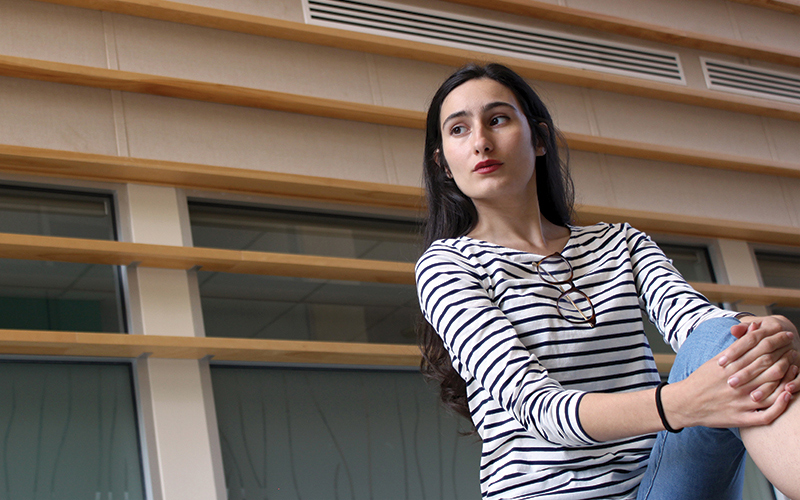
GABRIELLE MASONE (28)
CEO
Coloursmith Labs (Halifax)
Gabrielle Masone’s passion for vision care comes from a deeply personal place: she lost sight in her right eye when she was very young. “I thought I wanted to be an eye doctor and that was the intention until… I saw an opportunity to move faster and make big changes in vision care.”
Glasses worn to correct colour blindness or prevent migraines use special optical fibres in their lenses to filter out certain types of light, but Masone couldn’t find any contact lenses on the market that did the same.
“It started with a curiosity: ‘Why is that?’ That curiosity turned into a scientific proposal for how it could be done, and then that scientific proposal turned into a company.”
That company is Coloursmith, and it makes contact lenses to correct colour blindness. Masone won several pitch competitions with her idea, including the Innovacorp Spark Innovation Challenge, worth $50,000, in 2018. Coloursmith set up in The Labs at Innovacorp this summer, netted about $600,000 in pre-seed funding from investors like Island Capital Partners and Brigus Capital, and is now working with lens companies around the world to get Coloursmith lenses on the market.
Comment policy
Comments are moderated to ensure thoughtful and respectful conversations. First and last names will appear with each submission; anonymous comments and pseudonyms will not be permitted.
By submitting a comment, you accept that Atlantic Business Magazine has the right to reproduce and publish that comment in whole or in part, in any manner it chooses. Publication of a comment does not constitute endorsement of that comment. We reserve the right to close comments at any time.
Cancel